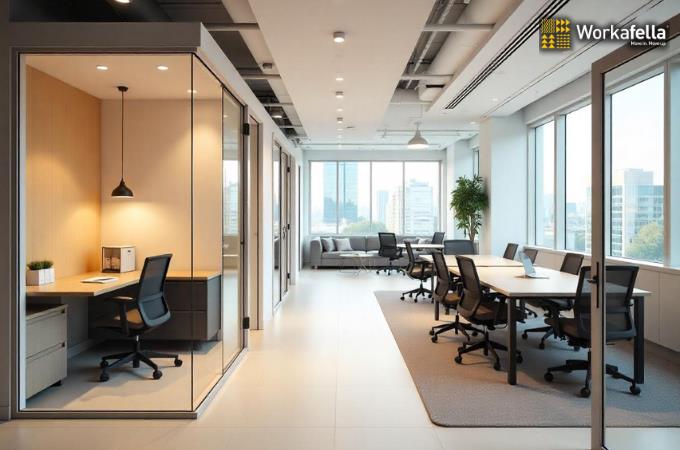Which Workspace is Best for Your Business – Shared Office or Private Office? In today’s dynamic business landscape, choosing the right workspace is a critical decision that impacts productivity, collaboration, and overall business success. With businesses evolving rapidly, traditional office spaces are no longer the only option. Whether you’re a startup, freelancer, or an established enterprise, finding the perfect balance between a shared office and a private office can significantly influence your work culture.
So, how do you decide which office space best suits your needs? Should you opt for the vibrant atmosphere of a coworking space, or do you need the exclusivity of a managed office space? Let’s explore the pros and cons of each to help you make an informed choice.
Understanding Shared Offices A shared office is a flexible workspace where multiple individuals or companies work in a common environment. This setup is a part of a coworking space, designed to foster networking, collaboration, and cost-efficiency.
Benefits of a Shared Office
1. Cost-Effective Solution : For startups and freelancers, a shared office offers an affordable alternative to traditional offices. The overhead costs, such as rent, utilities, and office maintenance, are split among members, making it a budget-friendly option.
2. Networking and Collaboration : Being surrounded by like-minded professionals in a coworking space opens doors to networking opportunities. The shared work environment encourages idea-sharing, potential collaborations, and business growth.
3. Flexibility and Scalability : One of the biggest advantages of a shared office is its flexibility. Businesses can easily scale up or down based on their needs without being locked into long-term leases.
4. Fully Equipped Workspace : Most shared offices come with high-speed internet, meeting rooms, lounge areas, and essential office supplies, allowing professionals to focus on work without worrying about infrastructure.
Limitations of a Shared Office
Less Privacy: If your business requires confidential discussions or frequent client meetings, the open setting of a shared office may not be ideal.
Distractions: The bustling environment of a coworking space can sometimes lead to distractions, making it challenging to maintain focus on high-priority tasks.
Understanding Private Offices
A private office space is a dedicated workspace that provides an enclosed and exclusive environment for businesses and professionals. These offices are often part of a managed office space, offering all the benefits of a traditional office with added flexibility.
Benefits of a Private Office
1. Enhanced Privacy and Security : For companies handling sensitive data or conducting confidential meetings, a private office ensures privacy and security, making it a preferred choice for law firms, financial institutions, and IT firms.
2. Distraction-Free Work Environment : A private office allows individuals and teams to work without distractions, improving focus and productivity. Unlike an open coworking space, private workspaces offer a quiet setting conducive to deep work.
3. Customization and Branding : A private office within a managed office space can often be customized to reflect the brand identity of a business. From furniture to decor, companies can create a workspace that aligns with their vision.
4. Professional Client Meetings : For businesses that frequently meet clients, having a dedicated office space enhances credibility and professionalism. Unlike a shared office, a private workspace offers a more controlled environment for presentations and discussions.
Limitations of a Private Office
Higher Costs: Compared to a shared office, renting a private office comes at a premium. Businesses need to consider whether the additional expense aligns with their operational requirements.
Less Networking: Unlike a coworking space, a private office may limit spontaneous interactions with professionals from diverse industries.
Shared Office vs. Private Office: Which One Should You Choose?
Choose a Shared Office If: - You are a freelancer, startup, or small business looking for a cost-effective and flexible office space. - You thrive in a collaborative environment and want access to networking opportunities. - You need access to premium amenities without bearing the entire cost.
Choose a Private Office If: - Your business requires confidentiality and a professional setting. - You need a distraction-free workspace to enhance productivity. - You want to customize your office space to reflect your brand.
The Best of Both Worlds: Flexible Office Space Solutions For businesses that need a mix of both privacy and collaboration, flexible office spaces provide the ideal balance. These workspaces combine the benefits of coworking spaces with the exclusivity of private offices, ensuring that companies get the best of both worlds. A managed office space offers tailored solutions, allowing businesses to choose between a shared office, a private office, or a hybrid workspace as per their needs. With short-term and long-term rental options, companies can adapt to changing business demands with ease.
Workafella: Your Ideal Workspace Solution Whether you need a shared office to connect with like-minded professionals or a private office for a focused work environment, Workafella offers the perfect solution. Our coworking spaces and managed office spaces are designed to cater to diverse business needs, providing state-of-the-art amenities, flexible lease terms, and a premium work environment.
Take the next step toward enhancing your work experience. Book a tour today and discover the perfect office space tailored for your business!

